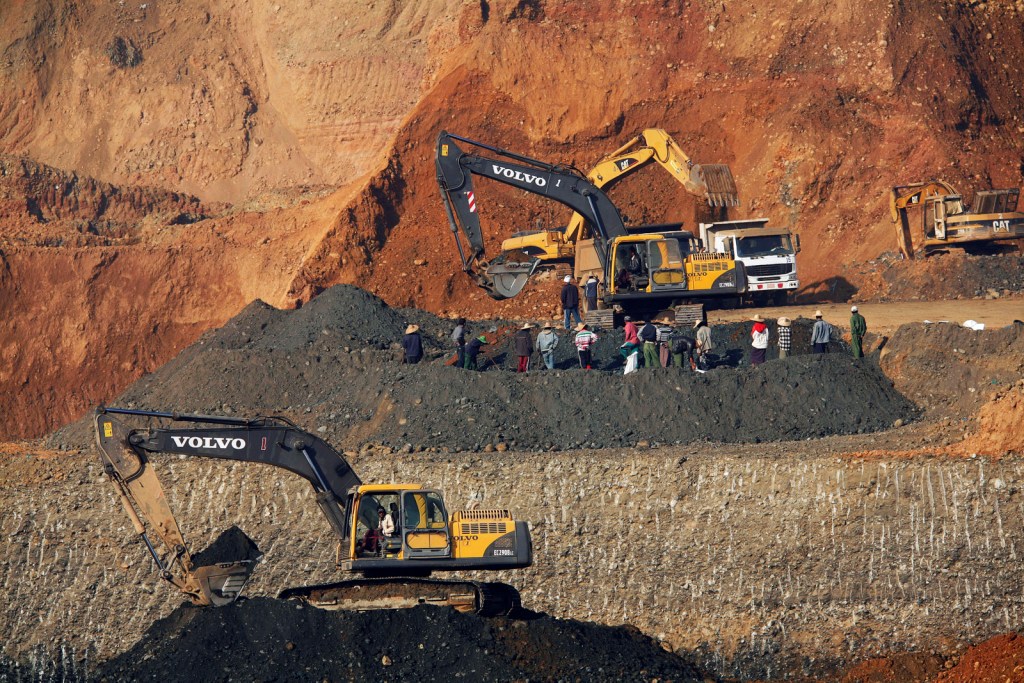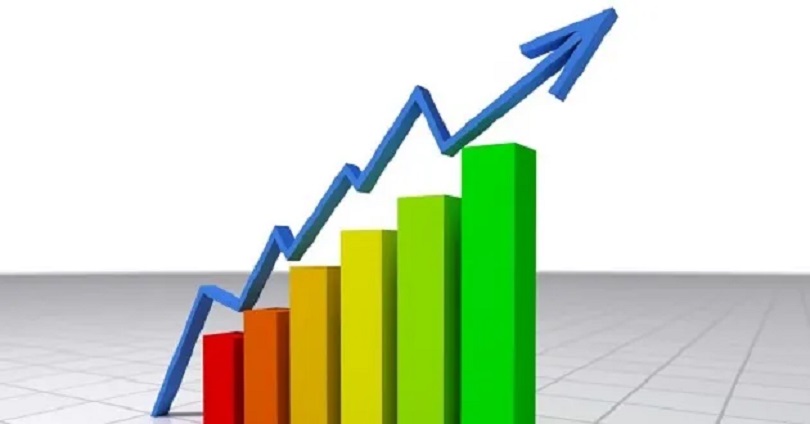Economy
Mining Sector to Contribute $27b to GDP by 2025—FG


By Modupe Gbadeyanka
It is no doubt that a lot has not been tapped from the mining industry in Nigeria, but the present government is focusing its attention to this just as it is doing with the agricultural sector.
At the moment, it is estimated that the contribution of the sector to the Gross Domestic Product (GDP) of Nigeria is $13 billion.
But the Ministry of Mines and Steel Development says it hopes to push this to about $27 billion by 2025.
This was revealed in the Ministry’s Road Map released on Sunday in Abuja, which was posted on its website and analysed by Business Post.
According to the Ministry’s roadmap, the impact on GDP will be significant as industries are able to use the output of the sector better, substituting for imports.
It also noted that the successful execution of the mining plan with unlock significant value for Nigeria and the net outcome will be creation of thousands of direct jobs and potentially hundreds of thousands of indirect jobs.
The Ministry said it would execute this roadmap in stages with the first focused on bringing stability to the sector and rebuilding the country’s market confidence between 2016 and 2018.
The second phase will focus on establishing Nigeria as a competitive African mining and mineral processing centre from 2016 to 2020, while the third phase will enable Nigeria compete in the global market for refined metals and minerals from 2018 to 2030 in addition to selected ore exportation.
“To ensure effective execution of the roadmap, a committee has recommended the formation of a Mining Implementation and Strategy Team (MIST) that will be the process owner of the roadmap and will be accountable for its implementation.
“MIST, as an advisory team to the Minister, will work across multiple MDAs, stakeholders and private institutions to ensure that the full potential of the minerals, mining and metals sector is achieved,” the Ministry said.
Recall that in 2015, the sector contributed approximately 0.33 percent to the GDP of the country. This contribution is a reversal from the historically higher percentages (about 4-5% in the 1960s-70s).
However, following a decade of reforms starting in 1999, this contribution represents a cautiously optimistic restart of the development of the sector.
The decade of reform saw key changes including, the passage of a new Nigerian Minerals and Mining Act (2007), a Nigerian Mineral and Metals Policy (2008), the creation of a modern Mining Cadastre system, the refinement of the tax code, and the expansion in airborne mapping of the country to sharpen knowledge of the mineral endowments. As important as these progress steps have been, Nigeria can and should do more.
The sector faces several challenges with geosciences data and information, Industry participants, Stakeholders, Institutions, Governance and other enablers of the sector.
According to the National Bureau of Statistics (NBS), gour sub-activities make up the Mining & Quarrying sector: Crude Petroleum and Natural Gas, Coal Mining, Metal ore and Quarrying and other Minerals.
On a nominal basis, the sector grew in the Fourth Quarter of 2016 by 54.68% (year on year). This was substantially above the growth rate recorded in the corresponding quarter of 2015, when a contraction of -35.12% was recorded.
This increase may be attributable in part to negotiations with militant groups in the Niger Delta region, who had been vandalizing oil infrastructure, but who reduced their attacks in the fourth quarter following these series of negotiations.
Coal mining and Metal ore activities in nominal terms, recorded growth rates of 14.16% and 24.24% respectively, significantly higher than the third quarter growth rates of 1.06% and 17.11% respectively.
The Mining & Quarrying sector contributed 7.10% to overall GDP during the fourth quarter of 2016, higher than the contribution recorded in same quarter of 2015 at 5.18%, and its contribution in the preceding quarter of 6.23%.
In real terms, Mining and Quarrying sector recorded a decline of -12.04% (year-on-year) in the fourth quarter of 2016. Although this is significantly smaller decline than that recorded in the previous quarter, of 21.64%, it is nevertheless 3.99% points lower than the growth rate recorded in the same Quarter of 2015 of –8.05.
The contribution of Mining and Quarrying to Real GDP in the fourth quarter of 2016 stood at 7.32%, representing a decline of 0.89% points relative to the corresponding quarter of 2015 and also a decline of 1.02% points relative to the third quarter of 2016.

Economy
Dangote Refinery Makes First PMS Exports to Cameroon

By Aduragbemi Omiyale
The Dangote Refinery located in the Lekki area of Lagos State has made its first export of premium motor spirit (PMS) just three months after it commenced the production of petrol.
In September 2024, the refinery produced its first petrol and began loading to the Nigerian National Petroleum Company (NNPC) on September 15.
However, due to some issues, the facility has not been able to flood the local market with its product, forcing it to look elsewhere.
In a landmark move for regional energy integration, Dangote Refinery has partnered with Neptune Oil to take its petrol to neighbouring Cameroon.
Neptune Oil is a leading energy company in Cameroon which provides reliable and sustainable energy solutions.
Dangote Refinery said this development showcases its ability to meet domestic needs and position itself as a key player in the regional energy market, adding that it represents a significant step forward in accessing high-quality and locally sourced petroleum products for Cameroon.
“This first export of PMS to Cameroon is a tangible demonstration of our vision for a united and energy-independent Africa.
“With this development, we are laying the foundation for a future where African resources are refined and exchanged within the continent for the benefit of our people,” the owner of Dangote Refinery, Mr Aliko Dangote, said.
His counterpart at Neptune Oil, Mr Antoine Ndzengue, said, “This partnership with Dangote Refinery marks a turning point for Cameroon.
“By becoming the first importer of petroleum products from this world-class refinery, we are bolstering our country’s energy security and supporting local economic development.
“This initial supply, executed without international intermediaries, reflects our commitment to serving our markets independently and efficiently.”
Economy
Strong Investor Sentiment Keeps NGX Index in Green Territory by 0.31%

By Dipo Olowookere
The Nigerian Exchange (NGX) Limited remained in the green territory on Wednesday after it rallied by 0.31 per cent on the back of sustained bargain-hunting activities by investors.
Business Post reports that all the key sectors of the market closed higher at midweek as a result of the renewed interest in local equities.
Data showed that the energy index appreciated by 2.59 per cent, the insurance space grew by 2.34 per cent, the industrial goods sector improved by 0.15 per cent, the banking counter expanded by 0.06 per cent, and the consumer goods industry rose by 0.04 per cent.
At the close of business, the All-Share Index (ASI) gained 302.71 points to settle at 98,509.68 points compared with Tuesday’s closing value of 98,206.97 points and the market capitalisation added N183 billion to close at N59.715 trillion versus the preceding day’s N59.532 trillion.
It was observed that the level of activity yesterday waned as the trading volume, value and number of deals decreased by 65.93 per cent, 49.22 per cent, and 12.70 per cent, respectively.
On Wednesday, a total of 320.1 million stocks valued at N6.5 billion were transacted in 7,943 deals, in contrast to the 939.4 million stocks worth N12.8 billion traded in 9,098 deals.
The busiest equity at midweek was eTranzact, which transacted 70.3 million units for N474.2 million, Universal Insurance traded 23.8 million units worth 8.1 million, Zenith Bank exchanged 21.2 million units valued at N933.5 million, FBN Holdings sold 18.6 million units worth N491.2 million, and UBA traded 14.0 million units valued at N465.8 million.
At the close of transactions, 34 shares ended on the gainers’ log and 17 shares finished on the losers’ chart, representing a positive market breadth index and strong investor sentiment.
Africa Prudential gained 10.00 per cent to quote at N14.30, Conoil also improved by 10.00 per cent to N352.00, and RT Briscoe expanded by 10.00 per cent to N2.42, as Golden Guinea Breweries jumped by 9.95 per cent to N7.18, while NEM Insurance grew by 9.74 per cent to N10.70.
However, Julius Berger lost 10.00 per cent to close at N155.25, Secure Electronic Technology shed 9.52 per cent to trade at 57 Kobo, Multiverse declined by 7.63 per cent to N5.45, Haldane McCall tumbled by 6.07 per cent to N4.95, and Honeywell Flour crashed by 5.62 per cent to N4.70.
Economy
Crude Oil Jumps as EU Slams Fresh Sanctions on Russia

By Adedapo Adesanya
Crude oil prices went up on Wednesday after the European Union (EU) agreed to an additional round of sanctions threatening Russian oil flows that could tighten global crude supplies.
During the session, Brent crude futures jumped by $1.33 or 1.84 per cent to $73.52 a barrel and the US West Texas Intermediate (WTI) crude futures rose by $1.70 or 2.48 per cent to $70.29 per barrel.
EU ambassadors agreed on a 15th package of sanctions on Russia over its war against Ukraine, targeting its shadow tanker fleet and Chinese firms making drones for the country.
The sanctions would target vessels from third countries supporting Russia’s war in Ukraine and add more individuals and entities to the sanctions list. It will not be adopted until after foreign ministers approve the package on Monday.
The shadow fleet has aided Russia in bypassing the $60 per barrel price cap imposed by the G7 on Russian seaborne crude oil in 2022 and has helped keep Russian oil flowing.
Prices were supported by the Energy Information Administration (EIA) which reported an estimated inventory decline of 1.4 million barrels for the week to December 6. In fuels, however, the EIA estimated sizable builds.
The crude oil inventory figure compares with a draw of 5.1 million barrels for the previous week that pushed prices higher for a while but the gains soon got erased by weak global demand growth prospects.
A day before the EIA, the American Petroleum Institute (API) had estimated inventory changes at a positive 499,000 barrels for the week to December 6.
Meanwhile, on Wednesday, the Organisation of the Petroleum Exporting Countries (OPEC) cut its 2024 global oil demand growth forecast for a fifth straight month and by the largest amount.
In its December report, the cartel expects 2024 global oil demand to rise by 1.61 million barrels per day, down from 1.82 million barrels per day last month.
OPEC also cut its 2025 growth estimate to 1.45 million barrels per day from 1.54 million barrels per day.
The 210,000 barrels per day cut in the 2024 figure is the largest of the five reductions OPEC has made in its monthly reports since August. In July, OPEC had expected world demand to rise by 2.25 million barrels per day.
Weak demand, particularly in top importer China, and non-OPEC+ supply growth were two factors behind the move.
-

 Feature/OPED5 years ago
Feature/OPED5 years agoDavos was Different this year
-
Travel/Tourism8 years ago
Lagos Seals Western Lodge Hotel In Ikorodu
-

 Showbiz2 years ago
Showbiz2 years agoEstranged Lover Releases Videos of Empress Njamah Bathing
-

 Banking6 years ago
Banking6 years agoSort Codes of GTBank Branches in Nigeria
-

 Economy2 years ago
Economy2 years agoSubsidy Removal: CNG at N130 Per Litre Cheaper Than Petrol—IPMAN
-

 Banking2 years ago
Banking2 years agoFirst Bank Announces Planned Downtime
-

 Sports2 years ago
Sports2 years agoHighest Paid Nigerian Footballer – How Much Do Nigerian Footballers Earn
-

 Technology4 years ago
Technology4 years agoHow To Link Your MTN, Airtel, Glo, 9mobile Lines to NIN



















